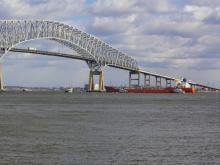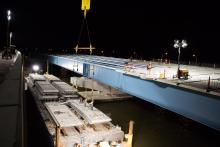A crane collapsed over the Tappan Zee Bridge in the US on July 19th. Construction work is being carried out on the bridge. The structure is located in Tarrytown, New York State and the bridge is around 40km north of central Manhattan, spanning the Hudson River at one of its widest points. The crane was being used for the construction work and collapsed right across the roadway and in front of vehicles using the crossing. A number of vehicles were damaged in the incident and local news reports suggest up to
A crane collapsed over the Tappan Zee Bridge in the US on July 19th. Construction work is being carried out on the bridge. The structure is located in Tarrytown, New York State and the bridge is around 40km north of central Manhattan, spanning the Hudson River at one of its widest points. The crane was being used for the construction work and collapsed right across the roadway and in front of vehicles using the crossing. A number of vehicles were damaged in the incident and local news reports suggest up to five people were injured, including vehicle occupants and one construction worker. The injuries are not thought to be serious however. Some vehicles were hit by falling debris while a number of others were involved in a shunt as they braked to avoid the wreckage.
The crane was driving piles for the new bridge, which has been under construction for three years. It is not clear at this stage what caused the crane to collapse however while the machine has been reported by local news outlets as being comparatively new.
The incident caused major traffic delays for drivers until the wreckage of the crane could be cleared to one side. Some drivers were forced to spend several hours sitting in their stalled vehicles on the bridge until they could be rediverted.
The new bridge should be complete in 2018 and its construction is costing in the area of US$3.9 billion. It will replace the existing structure which was built in 1955 and carries up to 138,000 vehicles/day, including a high percentage of heavy trucks, but is no longer able to cope with traffic demand.
The crane was driving piles for the new bridge, which has been under construction for three years. It is not clear at this stage what caused the crane to collapse however while the machine has been reported by local news outlets as being comparatively new.
The incident caused major traffic delays for drivers until the wreckage of the crane could be cleared to one side. Some drivers were forced to spend several hours sitting in their stalled vehicles on the bridge until they could be rediverted.
The new bridge should be complete in 2018 and its construction is costing in the area of US$3.9 billion. It will replace the existing structure which was built in 1955 and carries up to 138,000 vehicles/day, including a high percentage of heavy trucks, but is no longer able to cope with traffic demand.







